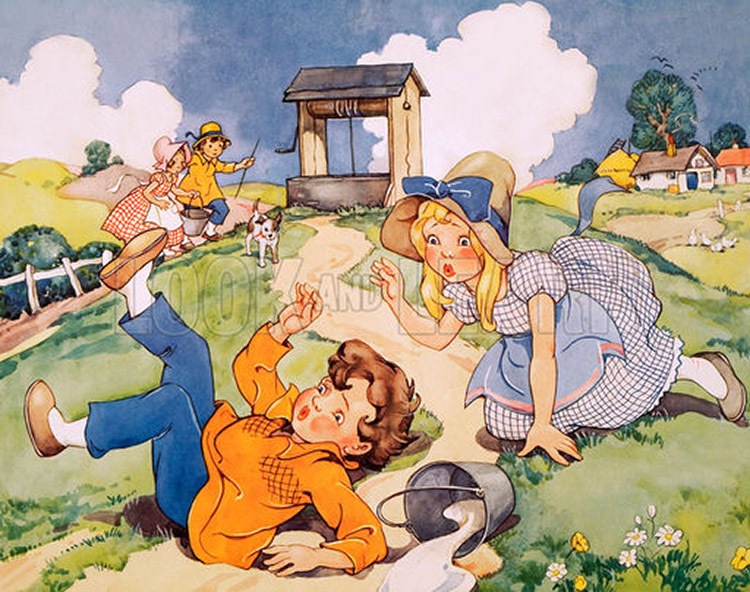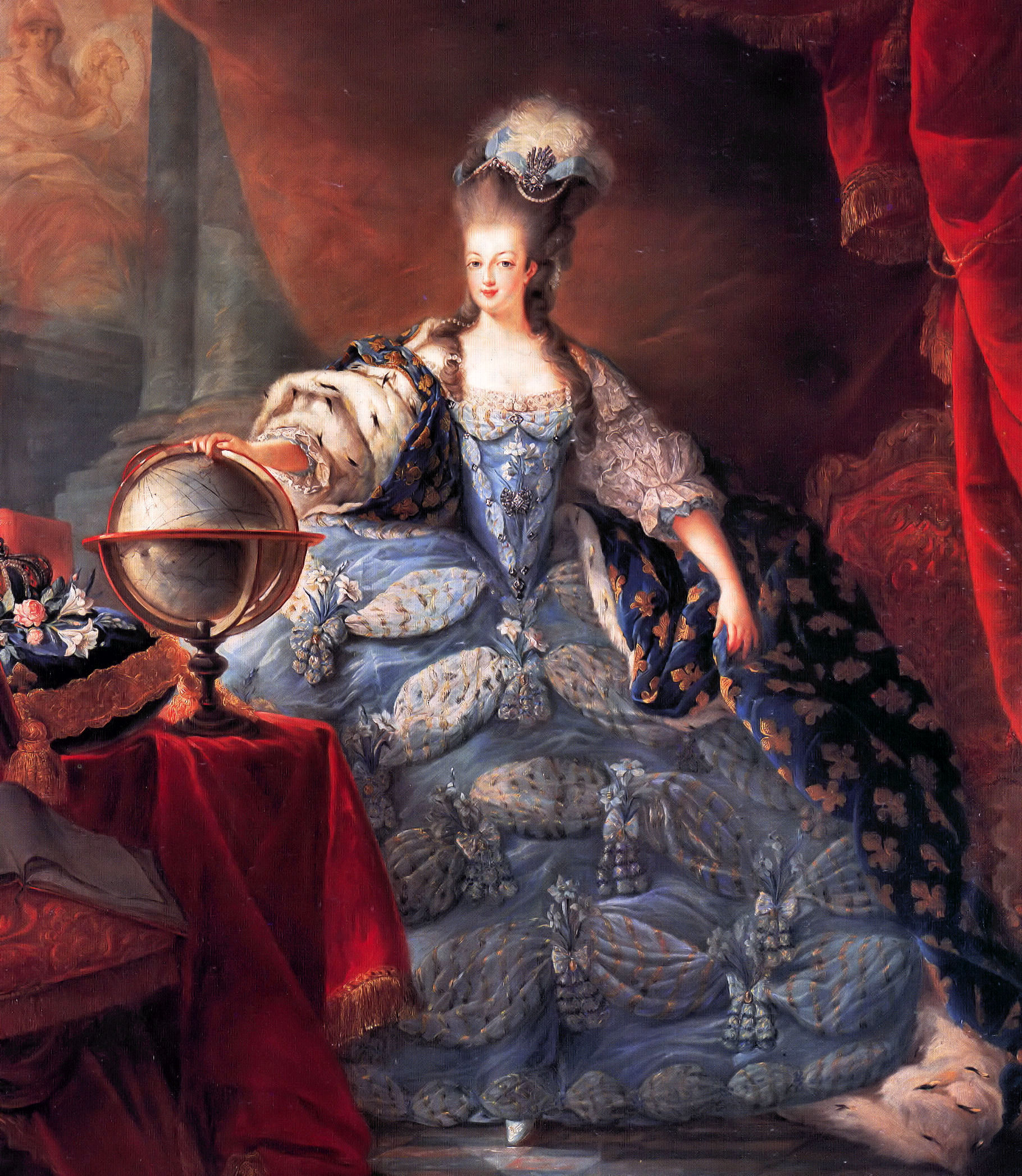儿歌《Jack And Jill》
歌词:
Jack and Jill went up the hill
to fetch a pail of water
Jack fell down and broke his crown
And Jill came tumbling after.
Up got Jack, and home did trot
As fast as he could caper
He went to bed and bound his head
With vinegar and brown paper.
Jill came in and she did grin
To see his paper plaster
Mother, vexed, did scold her next,
For causing Jack’s disaster.

歌曲来源及背景:
(关于英文的韵脚我看了半天都没看的很明白,也不知道falling rhyme是不是feminine rhyme,从表述上两个比较相近,那个学英文的给审定一下,不要让错误传播。)
- Jack and Jill went up the hill
- To fetch a pail of water.
- Jack fell down and broke his crown,
- And Jill came tumbling after.[1]
19世纪的小册子中许多版本变为15小节(stanzas),第二段为扩充部分,最初内容为:
- Up Jack got, and home did trot,
- As fast as he could caper;
- To old Dame Dob, who patched his nob
- With vinegar and brown paper.[1]
到了20世纪初有不同修订本
- Up Jack got and home did trot,
- As fast as he could caper;
- And went to bed and bound his head
- With vinegar and brown paper.[3]
第三节(verse)有些版本中会出现,这里选的三个音频中都没有,19世纪一些小册子中有选登 :
- Then Jill came in, and she did grin,
- To see Jack's paper plaster;
- Her mother whipt her, across her knee,
- For laughing at Jack's disaster.[1]
现代的一般版本中变为这一段,选用的音频中有两段中有此内容:
- When Jill came in how she did grin
- To see Jack's paper plaster;
- Mother vexed did whip her next
- For causing Jack's disaster.[3]

我感兴趣的是安托瓦内特居然和莫扎特有交集,而且她的本身那个时代也是华丽多姿的。7岁的玛丽·安托瓦内特遇见了6岁的莫扎特。他为皇家弹奏了最拿手的小星星。过后当女皇问他想要什么作为奖励时,莫扎特这样回答:他希望能在婚礼上与女皇最小女儿亲嘴。女皇被逗乐了,笑得前俯后仰。
而奥地利传记作家斯蒂芬·茨威格则在《断头王后》这本书里将此事描述为:莫扎特见到安托瓦内特,惊为天人,并一本正经地向她求婚,道:“我将来要娶你为妻的!”由于茨威格这本书的成功,这一描述被广泛地传诵。究竟两种说法何者为真,已是不可考。
传统童谣的内容大多有些荒谬,像这首歌里面两人成双山顶找水(山下会更容易些)。而醋和牛皮纸经常用来处理擦伤。早在16世纪就用短语"Jack and Jill"
在英语谚语中,有很多用到"Jack and Jill","Jack"和"Jill"在英语文化中泛指男生和女生而不指具体的某个人,这已经演变为英语语言的约定俗成,譬如说:
All shall be well Jack shall have Jill.有情人终成眷属
A good Jack makes a good Jill.夫善使妻贤
Every Jack shall has his Jill.人各有偶
All work and no play makes Jack a dullboy.用功不玩耍,孩子会变傻
A Jack of all trades is master of none.艺多者,无一精。
If Jack is in love,he is no judge of Jill's beauty.情人眼里出西施
词语溯源:
fetch /fɛtʃ/ 接来(某人); 使发出; 吸引; 售得(若干价钱)
古英语 feccan "to bring, bring to; seek, gain, take," >中古英语fecchen,
pail /peɪl/ 桶,提桶; 一桶的量
古英语 pægel “酒桶、液体容器”>中古英语 payle “木桶”
crown /kraʊn/
中古英语coroune, cr (o) une <诺曼英语coroune <拉丁语corōna wreath“花环”;
tumbling /ˈtʌm blɪŋ/
古英语tumbian "dance about, tumble, leap." 其他来源不详。
trot /trɒt/ 马的小跑; 人快步走; 摇摇摆摆学步的孩子; 〈古〉老太婆
原意为马,古法语trot "a trot, trotting" <<SPAN class=foreign>troter "to trot, to go,"
caper /ˈkeɪ pər/
希腊语kapparis "the caper plant or its fruit,">拉丁语
拉丁语 caper he-goat
bound /baʊnd/ vi.跳,弹跳; 限制; 接壤 ;n. 界限,限制; 跃起; (球等的)反跳
1、bind的过去分词和过去式
2、中古法语bond a leap, bondir to leap, orig. resound ≪拉丁语*bombitīre for *bombitāre to buzz, whiz ( 拉丁语bomb (us) (参看: bomb ) + -it- intensive后缀+ -ā- 元音词干+ -re infinitive 后缀)
3、中古英语bounde < 诺曼英语;古法语bone, bonde, bodne的变形 <<拉丁语budina,
4、中古英语b (o) un ready <<SPAN>古挪威语būinn, būa过去分词 to get ready
vinegar /vinegar/ 醋; 乖戾,尖酸刻薄; <口>充沛的精力
古法语 vinaigre "vinegar,醋" 。=vin "wine" (拉丁语vinum;
plaster /ˈplɑ:stə/ 灰泥,涂墙泥; 石膏; 膏药
希腊名词 emplastos "daubed on,涂抹"=en- "on" + plastos "molded">希腊语 emplastron "salve, plaster">拉丁语emplastrum "a plaster" (in the medical as well as the building sense)>通俗拉丁语plastrum>古英语plaster "medicinal application。"
拉丁语vexare "to shake, jolt, toss violently;"
disaster /dɪˈzɑ:stə(r)/ 灾难; 彻底的失败; 不幸; 祸患